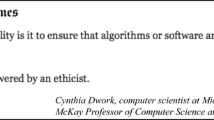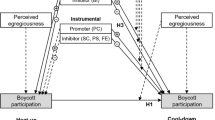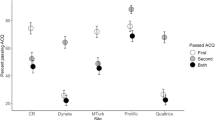Abstract
Software piracy is a serious problem in the software industry. Software authors and publishing companies lose revenue when pirated software rather than legally purchased software is used. Policy developers are forced to invest time and money into restricting software piracy. Much of the published research literature focuses on software piracy by end-users. However, end-users are only able to copy software once the copy protection has been removed by a ‘cracker’. This research aims to explore why, if copy protection is so difficult to remove, do crackers invest their skill and time in this activity instead of more lucrative and legal employment. This study develops a framework of neutralisation, justification and motivation and goes directly to the initial software crackers to determine what motivates their activities. The study first applies this framework in an anonymous online survey of crackers. The study then conducts cognitive interviews with eight crackers to explore and further validate the survey’s findings. The study finds the challenge of removing the copy protection from software as the strongest motivation for the actions of crackers. Desire for social participation, while found to be rewarding, was considered unnecessary for crackers to continue their actions. Higher social status was not a motivational factor but was a perceived by-product of cracking. The study also raises areas for future research.
Similar content being viewed by others
References
Adams, G. R. and J. D. Schvaneveldt: 1991, Understanding Research Methods, 2nd Ed., Longman Publishers.
C. P. Alderfer (1969) ArticleTitle‘An Empirical Test of a New Theory of Human Needs’ Organizational Behavior and Human Performance 4 142–175 Occurrence Handle10.1016/0030-5073(69)90004-X
I. Al-Jabri A. Abdul-Gader (1997) ArticleTitle‘Software Copyright Infringements: An Exploratory Study of the Effects of Individual and Peer Beliefs’ Omega, International Journal of Management Science 25 IssueID3 335 Occurrence Handle10.1016/S0305-0483(96)00053-9
A. Anastasi (1982) Psychological Testing EditionNumber5 Macmillan Publishers New York
D. R. Anderson D. J. Sweeney T. A. Williams (1987) Statistics for Business and Economics EditionNumber3 West Publishing Co. New York, USA
B. E. Ashforth F. Mael (1989) ArticleTitle‘Social Identity Theory and the Organization’ The Academy of Management Review 14 IssueID1 20–39 Occurrence Handle10.2307/258189
R. Barber (2001) ArticleTitle‘Hackers Profiled - Who Are They and What Are Their Motivations?’ Computer Fraud & Security 2001 IssueID2 14–17 Occurrence Handle10.1016/S1361-3723(01)02017-6
J. E. Barbuto R. W. Scholl (1998) ArticleTitle‘Motivation Sources Inventory: Development and Validation of New Scales to Measure an Integrative Taxonomy of Motivation’ Psychological Reports 82 1011–1022
Barnard, C.: 1938, The Functions of the Executive, Englewood Cliffs.
Cambanis, T.: 2002, ‘Leader of Software Theft Ring Sentenced’ The Boston Globe. 17 August.
T. L. Cheyne F. E. Ritter (2001) ArticleTitle‘Targeting Audiences on the Internet’ Communications of the ACM 44 IssueID4 94–98 Occurrence Handle10.1145/367211.367276
K. R. Conner R. P. Rumelt (1991) ArticleTitle‘Software Piracy: An Analysis of Protection Strategies’ Management Science 37 IssueID2 125–39
D. Constant L. Sproull S. Kiesler (1996) ArticleTitle‘The Kindness of Strangers: The Usefulness of Electronic Weak Ties for Technical Advice’ Organization Science 7 IssueID2 119–135
J. Creswell (1998) Qualitative Inquiry and Research Design: Choosing Among the Five Traditions Sage Publications Inc. Thousand Oaks, California, USA
D. Dabney (1995) ArticleTitle‘Neutralization and Deviance in the Workplace: Theft of Supplies and Medicines by Hospital Nurses’ Deviant Behavior 16 313–321 Occurrence Handle10.1080/01639625.1995.9968006
D. R. Dalton C. M. Daily J. C. Wimbush (1997) ArticleTitle‘Collecting ‘Sensitive’ Data in Business Ethics Research: A Case for the Unmatched Count Technique (UCT)’ Journal of Business Ethics 16 IssueID10 1049– 1058 Occurrence Handle10.1023/A:1017917904743
F. D. Davis (1989) ArticleTitle‘User Acceptance of Computer Technology: A Comparison of Two Theoretical Models’ Management Science 35 IssueID8 982–1003
M. De Young (1988) ArticleTitle‘The Indignant Page: Techniques of Neutralization in the Publications of Paedophile Organizations’ Child Abuse & Neglect 12 IssueID4 583–591 Occurrence Handle10.1016/0145-2134(88)90076-2
D. Deacon A. Bryman N. Fenton (1998) ArticleTitle‘Collision or Collusion? A Discussion and Case Study of the Unplanned Triangulation of Quantitative and Qualitative Research Methods’ International Journal of Social Research Methodology 1 IssueID1 47–63
E. L. Deci (1975) Intrinsic Motivation Plenum Press New York
N. Denzin (1970) ‘Strategies of Multiple Triangulation’ N. Denzin (Eds) The Research Act in Sociology: a Theoretical Introduction to Sociological Method McGraw-Hill New York 297–313
D. A. Dillman (1978) Mail and Telephone Surveys: The Total Design Method John Wiley and Sons New York
R. Dubin (1978) Theory Building Free Press New York
M. M. Eining A. L. Christensen (1991) ‘A Psycho-Social Model of Software Piracy: The Development and Test of a Model’ R. Dejoie G. Fowler D. Paradice (Eds) Ethical Issues in Information Systems Boyd & Fraser Boston 182–188
S. L. Eliason R. A. Dodder (2000) ArticleTitle‘Neutralization Among Deer Poachers’ Journal of Social Psychology 140 IssueID4 536–538 Occurrence Handle10.1080/00224540009600493
A. Etzioni (1961) A Comparative Analysis of Complex Organizations Free Press Glencoe
M. E. Ford (1992) Motivating Humans Sage Publications Newbury Park
B. Friedman (1997) ArticleTitle‘Social Judgments and Technological Innovation: Adolescents’ Understanding of Property, Privacy, and Electronic Information’ Computers in Human Behavior 13 IssueID3 327–351 Occurrence Handle10.1016/S0747-5632(97)00013-7
D. Galliers (1992) Information Systems Research Blackwells Oxford
D. K. Gauthier (2001) ArticleTitle‘Professional Lapses: Occupational Deviance and Neutralization Techniques in Veterinary Medical Practice’ Deviant Behavior 22 IssueID6 467–490 Occurrence Handle10.1080/016396201753227691
Gilbert, A.: 2003, ‘Extradition Sought for DrinkorDie Chief’, ZDNet.com.
M. Givon V. Mahajan E. Muller (1995) ArticleTitle‘Software Piracy: Estimation of Lost Sales and the Impact on Software Diffusion’ Journal of Marketing 59 IssueID1 29–38 Occurrence Handle10.2307/1252012
R. S. Glass W. A. Wood (1996) ArticleTitle‘Situational Determinants of Software Piracy: An Equity Theory Perspective’ Journal of Business Ethics 15 IssueID11 1189–1198 Occurrence Handle10.1007/BF00412817
R. D. Gopal G. L. Sanders (1997) ArticleTitle‘Preventive and Deterrent Controls For Software Piracy’ Journal of Management Information Systems 13 IssueID4 29–48
R. D. Gopal G. L. Sanders (1998) ArticleTitle‘International Software Piracy: Analysis of Key Issues and Impacts’ Information Systems Research 9 IssueID4 380–397 Occurrence Handle10.1287/isre.9.4.380
R. D. Gopal G. L. Sanders (2000) ArticleTitle‘Global Software Piracy: You Can’t Get Blood From A Turnip’ Communications of the ACM 43 IssueID9 82–89 Occurrence Handle10.1145/348941.349002
V. Grover C. Lee D. Durand (1994) ArticleTitle‘Analyzing Methodological Rigor of MIS Survey Research From 1980–1989’ Information & Management 24 IssueID6 305–318 Occurrence Handle10.1016/0378-7206(93)90028-R
M. Heltsley T. C. Calhoun (2003) ArticleTitle‘The Good Mother: Neutralization Techniques Used by Pageant Mothers’ Deviant Behavior 24 IssueID2 81–100 Occurrence Handle10.1080/01639620390117202
H. J. Highland (1984) Protecting Your Microcomputer System Wiley New York
S. Hinduja (2003) ArticleTitle‘Trends and Patterns Among Online Software Pirates’ Ethics and Information Technology 5 IssueID1 49–61 Occurrence Handle10.1023/A:1024910523384
R. C. Hollinger (1991) ArticleTitle‘Neutralizing in the Workplace: An Empirical Analysis of Property Theft and Production Deviance’ Deviant Behavior 12 169–202
A. Joinson (1999) ArticleTitle‘Social Desirability, Anonymity and Internet-Based Questionnaires’ Behavior Research Methods’ Instruments and Computers 31 433–438
D. Katz R. L. Kahn (1966) The Social Psychology of Organizations John Wiley & Sons New York
H. K. Klein M. D. Myers (1999) ArticleTitle‘A Set of Principles for Conducting and Evaluating Interpretive Field Studies in Information Systems’ MIS Quarterly 23 IssueID1 67–93 Occurrence Handle10.2307/249410
A. G. Kotulic J. G. Clark (2004) ArticleTitle‘Why There Aren’t More Information Security Research Studies’ Information & Management 41 IssueID5 597–607 Occurrence Handle10.1016/j.im.2003.08.001
K. K. Kwong O. H. M. Yau J. S. Y. Lee L. Y. M. Sin A. C. B. Tse (2003) ArticleTitle‘The Effects of Attitudinal and Demographic Factors on Intention to Buy Pirated CDs: The Case of Chinese Consumers’ Journal of Business Ethics 47 IssueID3 223–235 Occurrence Handle10.1023/A:1026269003472
S. Labovitz (1970) ArticleTitle‘The Assignment of Numbers to Rank Order Categories’ American Sociological Review 35 IssueID3 515–524 Occurrence Handle10.2307/2092993
Lau, F.: 1997, ‘A Review on the Use of Action Research in Information Systems and Qualitative Research’. Information Systems and Qualitative Research. L. A. Liebenau and J. Degross. London. 31–68.
Lee D., Lee I., Ahn J., Kong Y.: 2002, ‘The Illegal Copy Protection Using Hidden Agent’. Eurasia-ICT 2002: Information and Communication Technology, Proceedings. 832–841.
Lee, J.: 2002, ‘Pirates on the Web, Spoils on the Street’ The New York Times. 11 July 2002: 1.
R. M. Lee (1993) Doing Research on Sensitive Topics Sage London
W. B. Lee T. H. Chen (2002) ArticleTitle‘A Public Verifiable Copy Protection Technique for Still Images’ Journal of Systems and Software 62 IssueID3 195–204 Occurrence Handle10.1016/S0164-1212(01)00142-X
R. Likert (1932) ArticleTitle‘A Technique for the Measurement of Attitudes’ Archives of Psychology 140 IssueIDJune 5–53
V. K. G. Lim (2002) ArticleTitle‘The IT Way of Loafing on the Job: Cyberloafing, Neutralizing and Organizational Justice’ Journal of Organizational Behavior 23 675–694 Occurrence Handle10.1002/job.161
Limayem, M., Khalifa, M., Chin, W.: 1999, ‘Factors Motivating Software Piracy: A Longitudinal Study’. Proceedings of the 20th International Conference on Information Systems.
K. D. Loch S. Conger (1996) ArticleTitle‘Evaluating Ethical Decision Making and Computer Use’ Communications of the ACM 39 IssueID7 74–83 Occurrence Handle10.1145/233977.233999
E. A. Locke (1968) ArticleTitle‘Toward a Theory of Task Motivation and Incentives’ Organizational Behavior and Human Performance 3 157–189 Occurrence Handle10.1016/0030-5073(68)90004-4
J. M. Logsdon J. K. Thompson R. A. Reid (1994) ArticleTitle‘Software Piracy: Is It Related to Level of Moral Judgement?’ Journal of Business Ethics 13 849–857 Occurrence Handle10.1007/BF00871698
H. I. London (1975) Social Science Theory Structure and Application New York Press New York
K. Mackenzie (2002) ArticleTitle‘Jail for US Pirate’ The Australian 16 IssueIDJuly 26
M. K. Malhotra V. Grover (1998) ArticleTitle‘An Assessment of Survey Research in POM: From Constructs to Theory’ Journal of Operations Management 16 IssueID4 407–425 Occurrence Handle10.1016/S0272-6963(98)00021-7
A. H. Maslow (1943) ArticleTitle‘A Theory of Human Motivation’ Psychological Review 50 370–396
R. L. Mason (1989) ‘MIS Experiments: A Pragmatic Perspective The Information Systems Research Challenge’ I. Benbasat (Eds) Experimental Research Methods NumberInSeries2 Harvard Business School Press Boston 3–20
S. Mathison (1988) ArticleTitle‘Why Triangulate?’ Educational Researcher 17 IssueID2 13–17 Occurrence Handle10.2307/1174583
T. Maude D. Maude (1984) ArticleTitle‘Hardware Protection Against Software Piracy’ Communications of the ACM 27 IssueID9 950–959 Occurrence Handle10.1145/358234.358271
D. C. McClelland (1961) The Achieving Society Van Nostrand Princeton
W. W. Minor (1981) ArticleTitle‘Techniques of Neutralization: A Reconceptualization and Empirical Examination’ Journal of Research in Crime and Delinquency 18 IssueID2 295–318
P. Moore (2003) ArticleTitle‘Steal This Disk: Copy Protection, Consumers’ Rights, and the Digital Millennium Copyright Act’ Northwestern University Law Review 97 IssueID3 1437–1470
T. T. Moores J. Dhaliwal (2004) ArticleTitle‘A Reversed Context Analysis of Software Piracy Issues in Singapore’ Information & Management 41 IssueID8 1037–1042 Occurrence Handle10.1016/j.im.2003.10.005
T. Moores G. Dhillon (2000) ArticleTitle‘Software Piracy: A View From Hong Kong’ Communications of the ACM 3 IssueID12 88–92 Occurrence Handle10.1145/355112.355129
B. A. Nosek M.R. Banaji A. G. Greenwald (2002) ArticleTitle‘E-research: Ethics, Security, Design, and Control in Psychological Research on the Internet’ Journal of Social Issues 58 IssueID1 161–176 Occurrence Handle10.1111/1540-4560.00254
P. Peretti-Watel (2003) ArticleTitle‘Neutralization Theory and the Denial of Risk: Some Evidence From Cannabis Use Among French Adolescents’ British Journal of Sociology 54 IssueID1 21–42 Occurrence Handle10.1080/0007131032000045888
P. Piazza (2002) ArticleTitle‘Law Enforcement Targets Warez Sites’ Security Management 46 IssueID3 34
M. A. Pierce J. W. Henry (1996) ArticleTitle‘Computer Ethics: The Role of Personal, Informal, and Formal Codes’ Journal of Business Ethics 15 425–437 Occurrence Handle10.1007/BF00380363
M. M. Rahim A. H. Seyal M. N. A. Rahman (1999) ‘Software Piracy Among Tertiary Students In Brunei Darussalam: An Empirical Study’ Australian Institute of Computer Ethics Conference, Swinburne University of Technology Melbourne, Australia
V. Rosenberg (1989) ArticleTitle‘Software Theft and Copy Protection’ Library Journal 114 IssueID2 46–47
J. S. Schildkraut J. Gasper (2000) ArticleTitle‘Copy-Protection System for Photographic Paper’ Journal of Electronic Imaging 9 IssueID4 556–563 Occurrence Handle10.1117/1.1287533
A. C. Scott J. E. Clayton E. Gibson (1991) A Practical Guide to Knowledge Acquisition EditionNumber1 Addison-Wesley Publishers New York
J. P. Shim G. S. Taylor (1991) ‘A Comparative Study of Unauthorized Software Copying: Information Systems Faculty Members’ vs Practicing Managers’ Perceptions’ R. Dejoie G. Fowler D. Paradice (Eds) Ethical Issues in Information Systems Boyd & Fraser Boston 189–199
J. E. Sieber B. Stanley (1988) ArticleTitle‘Ethical and Professional Dimensions of Socially Sensitive Research’ American Psychologist 43 49–55 Occurrence Handle10.1037/0003-066X.43.1.49
P. M. Simpson D. Banerjee C. L. Simpson (1994) ArticleTitle‘Softlifting: A Model of Motivating Factors’ Journal of Business Ethics 13 431–438 Occurrence Handle10.1007/BF00881451
R. R. Sims H. K. Cheng H. Teegen (1996) ArticleTitle‘Toward a Profile of Student Software Piraters’ Journal of Business Ethics 15 IssueID8 839–849 Occurrence Handle10.1007/BF00381852
Z. Simsek J. F. Veiga (2000) ArticleTitle‘The Electronic Survey Technique: An Integration and Assessment’ Organizational Research Methods 3 IssueID1 93–115
Z. Simsek J. F. Veiga (2001) ArticleTitle‘A Primer on Internet Organizational Surveys’ Organizational Research Methods 4 IssueID3 218–235
M. A. Smith B. Leigh (1997) ArticleTitle‘Virtual Subjects: Using the Internet as an Alternative Source of Subjects and Research Environment’ Behavior Research Methods, Instruments and Computers 29 496–505
Software & Information Industry Association, 2000, SIIA’s Report on Global Software Piracy 2000.
S. L. Solomon J. A. O’Brien (1991) ‘The Effect of Demographic Factors on Attitudes Toward Software Piracy’ R. Dejoie G. Fowler D. Paradice (Eds) Ethical Issues in Information Systems Boyd & Fraser Boston 168–181
L. Sproull S. Kiesler (1991) Connections: New Ways of Working in the Networked Organization MIT Press Cambridge
D. W. Straub (1989) ArticleTitle‘Validating Instruments in MIS Research’ MIS Quarterly 13 IssueID2 147–169 Occurrence Handle10.2307/248922
D. Strutton S. J. Vitell L. E. Pelton (1994) ArticleTitle‘How Consumers May Justify Inappropriate Behavior in Market Settings: An Application on the Techniques of Neutralization’ Journal of Business Research 30 IssueID3 253–z260 Occurrence Handle10.1016/0148-2963(94)90055-8
G. M. Sykes D. Matza (1957) ArticleTitle‘Techniques of Neutralization: A Theory of Delinquency’ American Sociological Review 22 IssueID6 664–670 Occurrence Handle10.2307/2089195
J. C. Turner (1984) ‘Social Identification and Psychological Group Formation’ H. Tajfel (Eds) The Social Dimension: European Developments in Social Psychology Cambridge University Press Cambridge
M. Tyler (1984) ArticleTitle‘Software Piracy - Only One Per Customer’ Datamation 30 IssueID5 49
US Customs Service, 2001, ‘U.S. Customs Dismantles One of the World’s Most Sophisticated Internet Piracy Networks’, US Customs Press Release, Dec. 11, 2001.
M. D. Vernon (1969) Human Motivation CambridgeUniversity Press Cambridge
V. R. Waldron (1986) ArticleTitle‘Interviewing for Knowledge’ IEEE Transactions on Professional Communications 29 IssueID2 31–34
D. S. Wallach (2001) ArticleTitle‘Copy Protection Technology is Doomed’ Computer 34 IssueID10 48–49 Occurrence Handle10.1109/2.955098
H. P. M. Winchester L. N. Costello (1995) ArticleTitle‘Living on the Street - Social-Organization and Gender Relations of Australian Street Kids’ Environment and Planning D-Society & Space 13 IssueID3 329–348
L. T. Winfree G. L. Mays J. E. Crowley B. J. Peat (1994) ArticleTitle‘Drug History and Prisonization - Toward Understanding Variations in Inmate Institutional Adaptations’ International Journal of Offender Therapy and Comparative Criminology 38 IssueID4 281–296
Wold, G. H., and R. F. Shriver: 1989, Computer Crime, Rolling Meadows, Bankers Publishing Company.
Author information
Authors and Affiliations
Corresponding author
Additional information
Dr. Sigi Goode is a senior lecturer in Information Systems at the Australian National University, Canberra and a director of the Australian National Centre for Information Systems Research (NCISR). His PhD thesis dealt with construct validity in IS reserarch. Dr. Goode has published in a variety of journals, including Information & Management, Journal of Global Information Technology Management, Journal of Computer Information Systems, Information Systems Management, Information Technology and Management and the Australian Journal of Information Systems, among others. His research interests include system adoption, mobile commerce, software piracy and open source software.
Mr. Sam Cruise has a First Class Honours degree in Information Systems from the Australian National University. Sam has also worked as a project officer for an IT and health research project and recently completed a Graduate Diploma in Education from the University of Western Australia. Sam is currently studying medicine at Griffith University.
Sam’s research interests include software piracy and policy, education and information systems use.
Rights and permissions
About this article
Cite this article
Goode, S., Cruise, S. What Motivates Software Crackers?. J Bus Ethics 65, 173–201 (2006). https://doi.org/10.1007/s10551-005-4709-9
Issue Date:
DOI: https://doi.org/10.1007/s10551-005-4709-9




